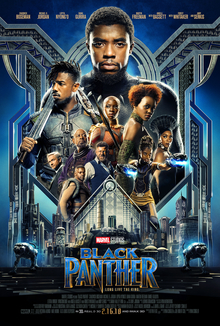REVIEW: ‘Black Panther’ proves to be the most culturally relevant MCU movie
It has become clear in the past weeks that “Black Panther” is one of the most loved films in the Marvel Cinematic Universe (MCU). From its stellar cast, great writing, phenomenal sets and design, as well as the usual action necessary for a Marvel film, the film has proven to be one of the early highlights of 2018. But as many have noticed, the film is proving to be much more than just a comic book film due to its cultural relevance and social commentary regarding both African and African-American culture.

The movie is directed by Ryan Coogler, who co-wrote the film with Joe Robert Cole. Coogler is one of the most prominent young black filmmakers to arise in recent years, having made two other critically acclaimed films: “Fruitvale Station” and “Creed.”
The film depicts Chadwick Boseman as T’Challa, king of the advanced African nation Wakanda, as he protects his country from a rising enemy as the Black Panther, a moniker and title worn by the ruler of Wakanda. The movie focuses on T’Challa coming into his role as king, while also dealing with antagonist Erik Killmonger, who wishes to challenge T’Challa for the throne.
One can see this is Coogler’s first major action film, especially during certain fighting and action sequences. While the film’s action and fight scenes are certainly entertaining, they aren’t as elaborate as previous Marvel films have tended to be. The film manages to fit well into the MCU while also standing out on its own. While parts of the film definitely connect to the overall MCU storyline and even sets up certain events for the upcoming “Avengers: Infinity War,” it is clear that Coogler was interested in crafting a film with its own mind, heart and spirit.
With that in mind, it’s not a stretch to say that this is the only Marvel film in the MCU that doesn’t just feel like a superhero film. The cultural relevance of the film makes it somewhat difficult to rank among the other movies in the MCU catalog. “Black Panther” stands as a film with a strong cultural message, something none of the Marvel films have done. It is certainly the most culturally relevant and political Marvel film since 2016’s “Captain America: Civil War,” which coincidentally was Black Panther’s first cinematic appearance.
The film’s cultural relevance can be seen in how the film chooses to address issues of African and African American culture, and the post-colonialism that has haunted Africa throughout its history. While most superhero films are more interested in telling a dynamic story of good versus evil, “Black Panther” provides viewers with a film interested in exploring what it means to be of African descent and gives us a perspective not usually seen in superhero films.
In the film, T’Challa is torn between whether he should continue to keep his nation of Wakanda hidden, or choose to use Wakanda’s endless resources to help suffering African and African American nations around the world. T’challah’s antagonist, Erik Killmonger, further enforces T’Challa’s dilemma by wishing to take over Wakanda in order to save other black nations while practically colonizing non-black nations.
“Black Panther” is certainly the most mainstream film to come out that fits into the Afrofuturism genre. Afrofuturism is a cultural aesthetic defined by its combination of science fiction and futuristic elements with Africa and African-American culture. The science fiction genre has always been used as a means of social commentary and exploring the potential and future of society. In Afrofuturism, the same purpose stands but is specifically aimed at exploring elements of the African diaspora, African and African American culture. This makes “Black Panther” revolutionary because it gives the audience a thought-provoking idea of what Africa could have been had it not been colonized, while also exploring the effects and reality of the African diaspora. The film in many ways manages to be a link between African culture and African-American culture, while also presenting audiences with a much more positive image of Africa, something hardly done in Hollywood.
T’Challa has proven to be more significant than any other black Marvel superhero as “Black Panther” places heavy emphasis on African culture and its status as a comic book film with a practically all-black cast. The best thing the two studios did with this film was reach out to the right people and allow the right amount of creative freedom.

